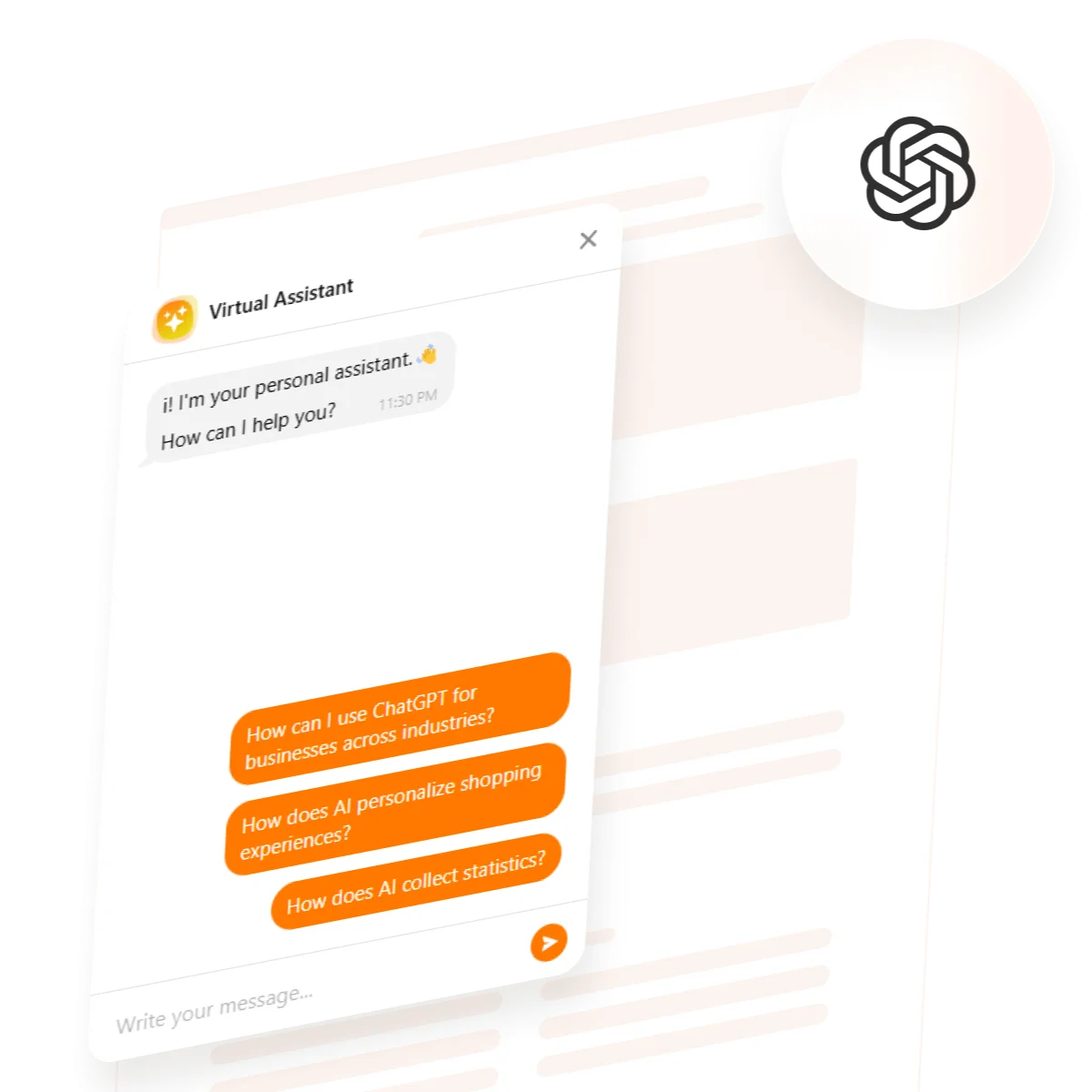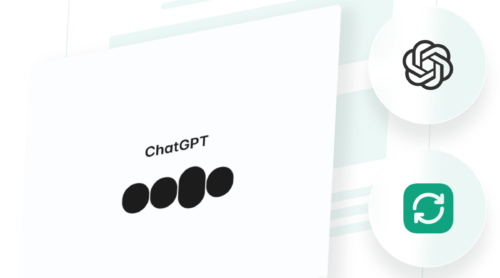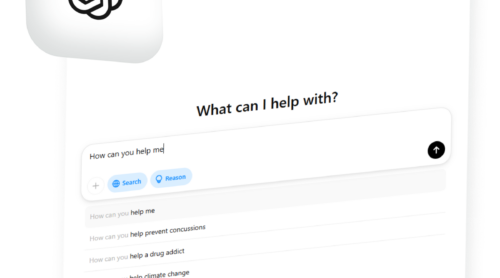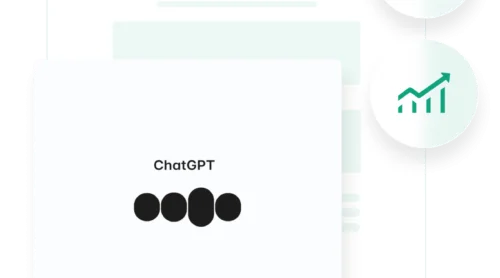In today’s fast-paced digital landscape, businesses are constantly looking for ways to streamline operations, enhance customer interactions, and boost overall efficiency. ChatGPT, powered by advanced AI, has emerged as a powerful tool that helps companies automate tasks, improve communication, and optimize workflows.
From automating customer support to generating high-quality content, ChatGPT is transforming industries across the board. Companies in healthcare, finance, retail, marketing, and beyond are leveraging AI to enhance productivity and deliver better user experiences. In this article, we’ll explore the top ChatGPT use cases across different industries, showcasing how businesses can harness AI for growth and innovation.
ChatGPT Use Cases by Industry
As businesses across various sectors embrace AI, ChatGPT is proving to be a game-changer in automating tasks, improving efficiency, and enhancing customer experiences. From personalized marketing strategies to real-time customer support, companies are leveraging AI-powered business solutions to stay competitive in the digital age.
Below, we explore how different industries are using ChatGPT to streamline operations, boost engagement, and drive sales.
🛒 Retail & Ecommerce
The retail and e-commerce industry is one of the biggest adopters of AI-powered solutions, and ChatGPT is transforming the way businesses interact with customers, manage marketing, and personalize shopping experiences. With online shopping becoming more competitive than ever, companies must find ways to stand out — AI-driven automation, personalized recommendations, and smart marketing strategies can provide that edge.
From helping customers find the perfect product to generating compelling ad copy, ChatGPT is streamlining multiple aspects of retail. Here’s how businesses are leveraging AI to enhance their operations:
1. AI-Powered Customer Support – Faster Responses, Higher Satisfaction
One of the most significant challenges in ecommerce is providing instant and effective customer support. Long response times and unanswered queries can lead to abandoned carts and lost sales. ChatGPT-powered chatbots solve this issue by handling inquiries in real time.
AI chatbots can:
- Assist with order tracking — Customers can instantly check their order status without needing human assistance.
- Guide users through returns and refunds — Automating this process reduces friction and improves customer retention.
- Answer product-related FAQs — AI can provide quick, accurate responses about product features, availability, and pricing.
By integrating ChatGPT into their customer service workflows, businesses reduce support costs, enhance user experience, and ensure that customers receive assistance 24/7 — all without increasing human workload.
Create an AI-driven chatbot with Elfsight and enhance customer interactions instantly! Whether you’re a beginner or a pro, Elfsight’s seamless setup and flexible customization options make building the perfect chatbot a breeze.
Boost engagement and streamline communication with an AI assistant — start today!
2. Smart Product Recommendations – Personalized Shopping Experiences
Shoppers today expect personalized experiences that cater to their unique preferences. ChatGPT helps ecommerce platforms analyze customer behavior and recommend relevant products in real-time.
Here’s how businesses use AI for personalized recommendations:
- Dynamic “You may also like” suggestions based on browsing history and past purchases.
- Tailored promotions and discount codes sent via email or chatbots.
- AI-powered shopping assistants that ask users about their preferences and provide custom product suggestions.
Retailers that use ChatGPT for personalized recommendations see higher engagement, increased sales, and improved customer satisfaction, as shoppers receive suggestions that genuinely match their needs.
3. AI-Generated Marketing & Copywriting – Engaging Content at Scale
Ecommerce businesses thrive on high-quality, persuasive content. ChatGPT enables brands to automate content creation while maintaining consistency and engagement across multiple channels.
Retailers use AI for:
- Writing product descriptions that are SEO-friendly and compelling.
- Generating email marketing campaigns with engaging subject lines and personalized messages.
- Creating ad copy for digital marketing – from Facebook and Instagram ads to Google Ads.
- Crafting blog content to drive organic traffic and educate potential buyers.
By leveraging ChatGPT for marketing and copywriting, ecommerce brands save time, maintain brand voice, and produce high-quality content at scale, ultimately driving more conversions.
🏥Healthcare & Wellness
The healthcare and wellness industry is rapidly adopting AI-driven solutions to enhance patient care, streamline administrative tasks, and support medical professionals. ChatGPT is playing a crucial role in improving accessibility, reducing workload for healthcare staff, and offering patients quick, reliable assistance.
From answering health-related questions to automating appointment scheduling, AI is transforming the way healthcare services are delivered. Here’s how medical professionals and wellness providers are leveraging ChatGPT:
1. Virtual Health Assistants – Instant Support for Patients
Many patients have basic medical questions but may not need an immediate in-person consultation. ChatGPT-powered virtual health assistants help bridge the gap between professional medical advice and online symptom-checkers.
AI-driven chatbots in healthcare can:
- Answer common health-related questions – Providing general information about symptoms, treatments, and medications.
- Guide patients on symptom checking – Offering preliminary insights into whether a condition requires urgent care or self-treatment.
- Provide mental health support – Offering conversational guidance for stress, anxiety, or lifestyle management.
While ChatGPT cannot replace doctors, it helps reduce unnecessary hospital visits, supports patient education, and improves access to health information.
2. Appointment Scheduling – Reducing Administrative Workload
Managing appointments manually can be time-consuming for both patients and healthcare providers. AI-powered scheduling assistants automate the process, ensuring smooth and efficient booking.
ChatGPT enhances appointment scheduling by:
- Helping patients find available slots and book appointments seamlessly.
- Sending automated reminders via email or SMS to reduce no-shows.
- Rescheduling or canceling appointments based on patient requests.
By integrating ChatGPT into their systems, healthcare providers free up administrative staff, improve scheduling efficiency, and enhance patient convenience.
3. Medical Research & Summarization – Helping Professionals Stay Updated
Healthcare professionals must keep up with vast amounts of medical literature, research papers, and clinical guidelines. ChatGPT assists doctors, researchers, and medical students by summarizing complex information into digestible insights.
AI can help in:
- Summarizing the latest research papers – Providing key takeaways from medical studies.
- Breaking down complex medical terminology – Making information accessible for both professionals and patients.
- Assisting in drafting reports and documentation – Helping doctors and nurses save time on paperwork.
By leveraging ChatGPT, healthcare professionals can stay informed, focus on patient care, and streamline research efforts without being overwhelmed by information overload.
💰 Finance & Banking
The finance and banking industry is undergoing a digital transformation, with AI-powered solutions reshaping the way financial institutions interact with customers and manage risk. ChatGPT is at the forefront of this shift, helping banks enhance customer service, improve security, and provide personalized financial guidance.
From answering banking queries to assisting in fraud detection, AI is streamlining operations and offering a more efficient, customer-friendly experience. Here’s how ChatGPT is revolutionizing finance and banking:
1. Automated Customer Support – 24/7 Assistance for Clients
Banks and financial institutions handle millions of customer inquiries daily. ChatGPT-powered chatbots help reduce wait times and improve customer satisfaction by automating responses to common banking queries.
AI-driven customer support can:
- Answer frequently asked questions – Providing information on account balances, interest rates, loan eligibility, and transaction status.
- Guide customers through online transactions – Assisting with transfers, bill payments, and mobile banking issues.
- Handle card-related requests – Helping users report lost or stolen cards, activate new cards, or reset PINs.
By implementing AI in customer service, banks can enhance user experience, reduce call center workload, and provide instant support around the clock.
2. Fraud Detection Assistance – Strengthening Security Measures
Financial fraud is a growing concern, and AI plays a vital role in detecting and preventing fraudulent activities before they escalate. While ChatGPT doesn’t directly detect fraud, it assists financial analysts in identifying suspicious transaction patterns.
AI-powered fraud detection helps by:
- Analyzing transaction histories to flag unusual spending behaviors.
- Identifying patterns associated with fraud and alerting security teams.
- Assisting customers in recognizing scam attempts through AI-driven educational messages and alerts.
By using ChatGPT to assist in fraud prevention, financial institutions can mitigate risks, enhance cybersecurity, and protect customers from financial crimes.
3. Financial Advice & Budgeting – Personalized Insights for Better Money Management
Consumers are increasingly looking for personalized financial guidance, and ChatGPT can serve as a virtual financial assistant to help users make informed decisions.
AI-driven financial guidance includes:
- Providing budget recommendations based on income, expenses, and saving goals.
- Suggesting investment strategies tailored to the user’s financial situation.
- Explaining complex financial concepts in simple terms to improve financial literacy.
Banks and fintech companies leveraging ChatGPT can enhance customer engagement, build trust, and empower users to take control of their finances.
📚 Education & E-Learning
The education sector is rapidly embracing AI-powered solutions to enhance learning experiences, improve accessibility, and provide personalized support for students and educators. ChatGPT is playing a pivotal role in assisting students, automating content creation, and offering interactive learning tools.
From AI tutors to automated content generation, ChatGPT is making education more efficient, engaging, and accessible to learners worldwide. Here’s how it’s transforming the industry:
1. AI Tutors – Interactive Learning Support for Students
Students often need quick, on-demand assistance with coursework, and ChatGPT can serve as a virtual tutor, providing real-time explanations and guidance.
AI tutors can:
- Answer student queries on various subjects, offering explanations in simple, easy-to-understand language.
- Break down complex topics into digestible concepts, adapting responses based on the student’s level of understanding.
- Provide step-by-step solutions for math problems, science equations, or coding exercises.
Unlike traditional learning, AI-powered tutoring is available 24/7, ensuring students can access educational support whenever they need it.
2. Content Creation – Automating Lesson Plans & Study Materials
Educators spend a significant amount of time creating course materials, including lesson plans, quizzes, and assignments. ChatGPT can streamline content creation by generating:
- Lesson outlines and structured study guides based on curriculum requirements.
- Custom quizzes and test questions, tailored to specific topics or difficulty levels.
- Summaries of lengthy academic texts, helping students quickly grasp key concepts.
By leveraging ChatGPT, educators can save time, enhance productivity, and focus more on personalized instruction rather than administrative tasks.
3. Language Learning Support – AI-Powered Conversation Practice
Language learners benefit from consistent practice and feedback, and ChatGPT can act as a virtual language tutor, providing:
- Grammar and spelling corrections to refine writing skills.
- Conversational practice in multiple languages to improve fluency and comprehension.
- Instant translations and explanations of phrases, idioms, and cultural contexts.
AI-powered language support allows learners to practice in a stress-free environment, making language acquisition more engaging and interactive.
📢 Marketing & Advertising
Marketing AI-powered tools like ChatGPT are redefining content creation, market research, and customer engagement. Businesses are leveraging AI to generate compelling content, analyze consumer behavior, and personalize marketing campaigns, making their strategies more efficient and data-driven.
Here’s how ChatGPT is revolutionizing the marketing industry:
1. SEO & Content Writing – High-Quality, AI-Generated Copy
Content is the backbone of digital marketing, but creating engaging, SEO-optimized copy takes time and expertise. ChatGPT helps marketers scale content production by:
- Writing blog posts, ad copies, and social media captions that align with brand voice.
- Generating keyword-rich content to improve search engine rankings and boost organic traffic.
- Repurposing existing content into different formats (e.g., turning blog posts into email newsletters).
With ChatGPT, businesses can produce high-quality content quickly, ensuring they stay ahead in the competitive digital landscape.
2. Market Research – Data-Driven Insights for Smarter Decisions
Understanding market trends and customer preferences is crucial for business success. ChatGPT assists marketers by:
- Analyzing industry trends and summarizing key insights from reports and articles.
- Conducting sentiment analysis on customer reviews and social media comments to gauge brand perception.
- Comparing competitor strategies, identifying gaps, and suggesting opportunities for differentiation.
By leveraging AI-driven research, businesses can make informed marketing decisions and refine their strategies based on real-time data.
3. Customer Engagement – Personalized Marketing at Scale
Engaging customers effectively requires personalization and timely communication. ChatGPT enhances customer interactions through:
- AI-powered chatbots, providing instant responses to customer inquiries on websites and social media.
- Personalized email marketing, crafting tailored messages based on user behavior and preferences.
- Dynamic ad copy generation, ensuring marketing messages are relevant to different audience segments.
With AI-driven engagement, businesses can build stronger relationships with their audience, increase conversions, and enhance brand loyalty.
💻 Technology & Software Development
In the ever-evolving world of technology and software development, ChatGPT is a valuable asset for developers, engineers, and IT professionals. By integrating AI into their workflows, companies can streamline development processes, improve productivity, and provide better support for both employees and customers. ChatGPT is especially useful in areas like code generation, debugging, and documentation, making it an indispensable tool in software development.
Let’s take a closer look at how ChatGPT is revolutionizing the tech and software industry:
1. Code Generation & Debugging – Streamlining Development Processes
Developers often spend a significant amount of time writing, testing, and debugging code. ChatGPT accelerates this process by:
- Generating boilerplate code based on simple prompts, reducing the need to write repetitive sections manually.
- Identifying and debugging code errors by suggesting potential fixes or offering solutions for commonly encountered issues.
- Providing code optimization tips to improve the performance and efficiency of existing code.
By assisting with these tasks, ChatGPT allows developers to focus on more complex coding challenges while increasing their overall development speed and reducing the chance of human error.
2. Automated Documentation – Making Technical Writing Easy
Documentation is a critical but often time-consuming part of software development. ChatGPT helps by:
- Summarizing API documentation, making it easier for developers to understand how to integrate third-party services into their applications.
- Generating technical guides, such as step-by-step tutorials or implementation instructions, in a consistent and structured format.
- Writing release notes and automating changelogs, ensuring that all updates and improvements are clearly communicated to the development team and end users.
With AI-driven documentation, businesses can ensure that their technical materials are always up-to-date, accurate, and easy to understand, helping development teams move faster and reducing the manual workload.
3. Chatbots for IT Support – Revolutionizing IT Help Desks
Managing IT support is essential for any company, but it can be resource-intensive. ChatGPT enhances IT support by:
- Automating responses to common IT issues, such as password resets, software installations, and network troubleshooting.
- Providing instant solutions to technical problems, reducing response times and freeing up IT staff for more complex tasks.
- Handling tier-one IT support, which ensures that only more advanced issues are escalated to human agents.
By deploying AI-powered chatbots, businesses can offer round-the-clock IT support, enhance employee productivity, and reduce downtime caused by technical problems.
🏠 Real Estate & Property Management
In the real estate and property management industry, ChatGPT is making significant strides by automating various tasks that previously required human intervention. Whether you’re a real estate agent, property manager, or investor, ChatGPT can help streamline processes, reduce workloads, and improve the overall customer experience. From lead generation to market analysis, AI is helping professionals make smarter decisions and drive growth in the real estate sector.
Let’s dive into the key ChatGPT use cases for the real estate industry:
1. Chatbots for Lead Generation – Streamlining Customer Interactions
Generating and nurturing leads is one of the most critical tasks for real estate agents. With ChatGPT-powered chatbots, agents can:
- Automatically respond to inquiries from potential buyers or renters, answering basic questions about properties and availability.
- Schedule property viewings and follow up with leads, ensuring timely communication without requiring manual effort.
- Qualify leads by gathering key information such as preferred location, budget, and type of property, then passing on qualified leads to human agents for further action.
By automating lead generation and initial interactions, ChatGPT allows agents and property managers to focus on high-priority tasks, such as negotiations and client relationships, while improving response times and customer satisfaction.
2. Property Descriptions – Engaging Listings Made Easy
Crafting compelling property descriptions is crucial for attracting potential buyers or tenants. ChatGPT assists in:
- Automatically generating property listings, using details such as size, features, and location to create descriptions that are both informative and engaging.
- Highlighting key selling points, ensuring that each listing showcases the most appealing aspects of the property in a way that resonates with target audiences.
- Optimizing property descriptions for SEO, ensuring better visibility in search engines and attracting more visitors to listings.
This use of AI helps real estate professionals create consistent, high-quality property listings faster, which leads to improved lead conversion rates and increased property visibility online.
3. Market Analysis – Enhancing Decision-Making with Data Insights
In real estate, understanding the market is essential for making smart investment and pricing decisions. ChatGPT can assist with:
- Analyzing market trends, identifying changes in property pricing, demand, and location popularity.
- Generating reports on neighborhood dynamics, offering insights into which areas are growing or experiencing increased demand.
- Providing pricing recommendations, suggesting optimal pricing strategies for properties based on current market conditions.
By leveraging ChatGPT for market analysis, real estate professionals can access valuable insights more efficiently, enabling them to make better pricing, investment, and sales decisions.
⚖ Legal & Compliance
The legal and compliance industry is known for its complexity, with large volumes of documents and intricate regulations to navigate. ChatGPT is playing an essential role in streamlining processes, reducing workloads, and enhancing the accuracy of legal and compliance tasks. Whether it’s drafting documents, summarizing case law, or ensuring compliance, ChatGPT provides support that saves valuable time and resources for legal professionals.
Let’s explore the main ChatGPT use cases in the legal and compliance field:
1. Legal Document Drafting – Automating Contracts and Agreements
Drafting legal documents is time-consuming and requires attention to detail. With ChatGPT, legal professionals can:
- Automate the creation of contracts, agreements, and policy documents by inputting key terms and conditions.
- Generate templates for standard documents like NDAs, employment contracts, or real estate agreements, ensuring consistency and reducing errors.
- Adapt legal language based on the jurisdiction or specific needs of the case, making it easy for lawyers to tailor documents quickly.
By automating routine document creation, ChatGPT allows lawyers to focus on more complex tasks and reduce the time spent drafting or reviewing contracts, improving both efficiency and accuracy.
2. Case Law Summarization – Extracting Key Points
Legal professionals often deal with lengthy case law and regulatory documents that can take hours to read through. ChatGPT helps by:
- Summarizing case law and other legal texts, extracting key points such as court decisions, precedents, and relevant statutes.
- Providing concise summaries of legal rulings to ensure lawyers can quickly grasp the most important aspects of a case.
- Highlighting critical points that are directly applicable to the lawyer’s case, saving them time and enhancing their ability to make informed decisions.
This use of AI drastically cuts down on research time and helps lawyers keep up with vast amounts of legal documentation, improving their decision-making and overall case strategy.
3. Compliance Assistance – Staying Updated with Regulations
Compliance is a significant concern for businesses, and ChatGPT can be a valuable asset in this area. It helps with:
- Providing information on regulations and business policies, including details on tax laws, data privacy regulations, and labor laws.
- Automating compliance checks, ensuring that contracts, policies, and business practices align with relevant laws.
- Alerting legal teams to changes in regulations, helping them stay up-to-date on important updates or new laws that could impact their business operations.
With ChatGPT, legal and compliance teams can ensure their business operations remain legally compliant, without having to spend hours manually checking for regulatory updates or conducting routine compliance checks.
👥 Human Resources & Recruitment
In the Human Resources and recruitment sector, where processes are often repetitive and time-sensitive, ChatGPT is proving to be a game-changer. AI-powered solutions are increasingly being used to enhance recruitment efficiency, streamline onboarding, and improve employee satisfaction. By automating routine HR tasks and providing quick, consistent information, ChatGPT can free up valuable time for HR professionals to focus on higher-value activities like employee engagement and talent development.
Let’s explore the primary ChatGPT use cases within Human Resources and Recruitment:
1. Resume Screening – Automating Job Application Reviews
Screening resumes and applications is one of the most time-consuming parts of the recruitment process. ChatGPT helps by:
- Automating the initial review of job applications, sorting resumes based on key qualifications and experience.
- Identifying top candidates by evaluating resumes against job descriptions, ensuring no strong applicant is overlooked.
- Categorizing applications, allowing HR teams to focus only on the most promising candidates and prioritize their next steps in the hiring process.
By streamlining the resume screening process, ChatGPT helps HR teams reduce manual work, accelerate candidate shortlisting, and ensure a more efficient hiring process.
2. Employee Onboarding – Providing Interactive Training and FAQs
Effective employee onboarding is crucial for setting new hires up for success, and ChatGPT plays a major role in this. AI can:
- Guide new employees through the onboarding process, providing them with an interactive and engaging experience.
- Answer common onboarding questions, from IT setup inquiries to company policies, making the process smoother and more self-sufficient for new hires.
- Provide training materials and resources for employees to complete at their own pace, offering personalized learning experiences tailored to each role.
With ChatGPT, new employees get a personalized and efficient onboarding experience, allowing them to get up to speed quickly and start contributing to the organization without delay.
3. HR Policy Assistance – Clarifying Leave Policies and Benefits
Employees often have questions about leave policies, benefits, and other HR-related matters. ChatGPT can assist by:
- Providing instant answers to employee questions about sick leave, vacation days, and benefit packages.
- Clarifying complicated policies, such as how to request time off, eligibility for different benefits, or the details of health insurance coverage.
- Reducing HR team workload by automating responses to frequently asked questions, enabling HR staff to focus on more strategic tasks.
With ChatGPT-powered HR policy assistance, employees can quickly get the answers they need, improving employee satisfaction and reducing HR’s response time to common inquiries.
✈ Travel & Hospitality
The Travel & Hospitality industry is increasingly relying on AI-powered solutions like ChatGPT to provide exceptional customer service, streamline booking processes, and manage reputation in real-time. As the demand for more personalized and immediate travel experiences grows, ChatGPT has become a vital tool for enhancing customer interactions, making trip planning easier, and ensuring 24/7 availability for travelers. Let’s take a closer look at the key use cases for ChatGPT in this dynamic sector.
1. AI Travel Assistants – Helping Customers Plan Trips and Book Hotels
Booking travel can be a complicated process, often involving multiple steps and decisions. ChatGPT is transforming this experience by:
- Guiding customers through the trip planning process, helping them select flights, hotels, and activities based on their preferences.
- Offering tailored recommendations, such as nearby attractions, restaurant suggestions, and local events, to enhance the customer’s travel experience.
- Facilitating the booking process by providing easy access to reservation systems, allowing users to book flights, hotels, and tours directly through the chatbot.
With AI travel assistants, ChatGPT makes trip planning simpler, more convenient, and personalized, allowing customers to book everything they need with ease and confidence.
2. Multilingual Support – Translating Customer Queries in Real-Time
Travelers often encounter language barriers, especially when traveling internationally. ChatGPT’s multilingual capabilities help by:
- Translating customer queries in real-time, ensuring that language does not hinder communication between travelers and service providers.
- Providing immediate assistance to customers in their preferred language, enhancing their experience and satisfaction.
- Supporting hotel and airline staff with automated translation for reservations, customer inquiries, and support, making it easier for them to cater to a diverse customer base.
With ChatGPT’s multilingual support, businesses in the travel and hospitality industry can offer more inclusive services, ensuring seamless interactions no matter the customer’s language.
3. Review & Reputation Management – Generating Responses to Customer Reviews
In the Travel & Hospitality industry, maintaining a positive online reputation is crucial for attracting new customers. ChatGPT helps manage customer feedback by:
- Generating thoughtful responses to customer reviews, both positive and negative, ensuring timely engagement with guests.
- Personalizing responses based on specific feedback, acknowledging guests’ experiences, and providing solutions for complaints.
- Analyzing customer sentiment from reviews, enabling businesses to identify areas for improvement and gauge customer satisfaction levels.
With ChatGPT’s review and reputation management, businesses can proactively manage their online presence, enhancing their brand image and building trust with future customers.
Universal Solution: GPT-Powered Chatbot
While businesses across various industries have unique needs, one universal solution can simplify processes for any sector—an AI-powered website chatbot.
Meet Elfsight AI Chatbot ✨
This intelligent, customizable assistant is designed to improve customer engagement and automate communication with ease. Whether you’re in retail, finance, or any other field, the chatbot adapts to your needs with pre-built industry-specific templates, ensuring a smooth and efficient experience.
- Ecommerce AI Chatbot can handle product recommendations, order tracking, and FAQs.
- Healthcare AI Chatbot answers common medical inquiries and assists with appointment scheduling.
- Real estate AI Chatbot can be used for property inquiries, scheduling viewings, and mortgage guidance.
Beyond industry-focused customization, Elfsight AI Chatbot supports multilingual interactions, smart conversation flows, and seamless website integration. It enhances efficiency, reduces workload, and improves customer satisfaction — all without requiring any technical skills.
Ready to bring AI to your business? Explore Elfsight’s wide range of AI Chatbot templates and discover how it can transform your website today!
Conclusion
ChatGPT is transforming industries by streamlining customer support, automating repetitive tasks, and enhancing decision-making. From retail and healthcare to finance and real estate, businesses are leveraging AI to improve efficiency, engage customers, and boost productivity. As AI continues to evolve, its applications will become even more sophisticated, opening new opportunities for automation and innovation.
Embracing AI-driven solutions like ChatGPT can give businesses a competitive edge in today’s fast-paced digital landscape. Whether through chatbots, content generation, or data analysis, integrating AI into business operations can enhance customer experiences and drive growth. Now is the perfect time for businesses to explore AI-powered tools and stay ahead of the curve.






